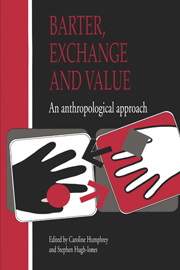Book contents
- Frontmatter
- Contents
- List of figures
- List of contributors
- 1 Introduction: Barter, exchange and value
- 2 Politicised values: the cultural dynamics of peripheral exchange
- 3 Yesterday's luxuries, tomorrow's necessities: business and barter in northwest Amazonia
- 4 Some notes on the economics of barter, money and credit
- 5 Fair dealing, just rewards: the ethics of barter in North-East Nepal
- 6 Inter-tribal commodity barter and reproductive gift-exchange in old Melanesia
- 7 Qualified value: the perspective of gift exchange
- Index
2 - Politicised values: the cultural dynamics of peripheral exchange
Published online by Cambridge University Press: 05 June 2012
- Frontmatter
- Contents
- List of figures
- List of contributors
- 1 Introduction: Barter, exchange and value
- 2 Politicised values: the cultural dynamics of peripheral exchange
- 3 Yesterday's luxuries, tomorrow's necessities: business and barter in northwest Amazonia
- 4 Some notes on the economics of barter, money and credit
- 5 Fair dealing, just rewards: the ethics of barter in North-East Nepal
- 6 Inter-tribal commodity barter and reproductive gift-exchange in old Melanesia
- 7 Qualified value: the perspective of gift exchange
- Index
Summary
Barter has always been associated with social margins. It is paradigmatically the form of exchange which is expected to take place across the frontiers between non-monetised economies, between strangers rather than relatives or friends. From the perspective of a monetised economy, it is also peripheral in the sense that it belongs beyond the domain of currency transactions: it is associated with a marginal, primitive world which we define by the absence of such things as money, writing and the state, rather than by its own positive attributes. That world is no longer purely primitive, and the various forms of colonial penetration and development have clearly had catastrophic consequences for many tribal peoples. In some of these histories, peripheral barter figures as the origin of dependency; the allure of European goods appears as the beginning of asymmetry, the seed of a transformation which some would render positively as progress, and others regret as a corrosion of culture. Does early exchange play this historic role, or does the image turn only on European constructions?
I begin with a string of stories about early exchange on colonial peripheries, that suggest that exchange was not generally dominated by narrow utilitarian interests, and that commonsense interpretations of the functions of articles of trade frequently pass over attributions of value arising from the associations of things rather than their material properties. In the Oceanic cases discussed, these associations arise from prior indigenous attitudes to foreigners and the particular experience of contact with whites.
Information
- Type
- Chapter
- Information
- Barter, Exchange and ValueAn Anthropological Approach, pp. 21 - 41Publisher: Cambridge University PressPrint publication year: 1992
Accessibility standard: Unknown
Why this information is here
This section outlines the accessibility features of this content - including support for screen readers, full keyboard navigation and high-contrast display options. This may not be relevant for you.Accessibility Information
- 20
- Cited by
